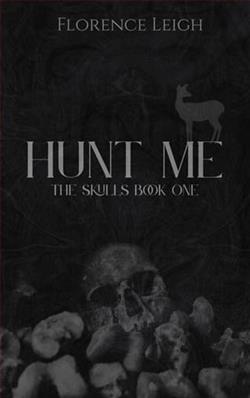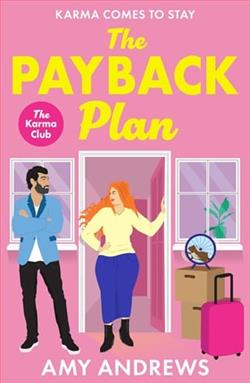Page 4 of Life After You
The bus rumbles beneath me, a steady vibration that’s become both a lullaby and a reminder of how far I’ve come. I lean my forehead against the cold glass, watching the dark highway stretch endlessly into the distance. The rain started somewhere south of Seattle, a fine mist at first, growing heavier as we closed in on Portland.
Inside the bus, the dim lighting casts everything in shadows. A handful of passengers are scattered in their seats—an older woman knitting, a man snoring softly in the back, a teenager in a hoodie scrolling through his phone. I shift, trying to find a position that doesn’t make my neck ache. My body feels like it’sbeen folded into this cramped space for days, though it’s only been hours.
I must drift off at some point because when I open my eyes again, the bus is slowing, the faint glow of streetlights blurring through the rain-streaked windows. Portland. The city rises up out of the mist, its skyline hazy and dreamlike in the pre-dawn gloom. Bridges arch over the water, their lights flickering like constellations reflected in the river below.
The driver’s voice crackles over the intercom, announcing the last stop. My heart thuds as I grab my bag and step off the bus. The cold is immediate, sharp and unrelenting, seeping through my jacket as I stand on the sidewalk. The air smells of wet concrete and damp leaves, a stark contrast to the stale, recycled air inside the bus.
Downtown Portland is quieter than I expected. The streets are mostly empty, aside from the occasional streetcar gliding by or the distant hum of a car. Neon signs buzz faintly in shop windows, advertising coffee, doughnuts, and bars that are probably still open from the night before.
I pull my jacket tighter around me and start walking, my sneakers squeaking against the slick pavement. I don’t know exactly where I’m going, but I can’t just stand here, soaking in the rain like some lost tourist.
The city feels both alive and asleep at the same time, like it’s holding its breath. As I wander past murals painted on brick walls and clusters of bicycles chained to metal racks, a shop catches my eye.
It’s nothing fancy—just an old auto shop with a faded red and white sign hanging above the door. Si’s Custom Garage. The wide bay doors are rolled down, but the light spilling from the office window makes the place feel awake, even in the early morning stillness. Car parts are piled along the walls—tires, mufflers, the rusted shell of a half-rebuilt classic.
For a moment, I don’t move.
It’s the kind of place my brother would’ve loved. The kind of place that would’ve had him grinning ear to ear, rattling off car specs and dreaming up ways to modify his ’69 Dodge Charger. He rebuilt it from the ground up, piece by painstaking piece. I can still see him in our Grams’ garage, grease smudged across his face, hands steady and sure as he worked.
The memory hits like a gut punch. My chest tightens, and I press a hand to my stomach, trying to keep the sob from breaking free. If he were here, he’d drag me inside, firing off a hundred questions just to hear the mechanics talk shop.
But he’s not here. He never will be.
The rain stings my cheeks, or maybe it’s the tears I didn’t realize were falling. I force myself to look away, to keep walking, even as the ache in my chest spreads like a crack through something I can’t repair.
Up ahead, the glow of Patty’s Diner flickers through the mist, a welcome distraction from the hollow feeling settling in my stomach. The cheerful cursive letters and blinking neon border pull me in, promising warmth, food—something solid to hold on to.
The bell jingles as I step inside, and for a second, I just stand there, letting the heat of the place sink into my frozen bones.
Outside, the rain comes down in sheets, typical for Portland in mid-April. The scent of wet asphalt clings to me, mixing with the damp chill that seeps into the city’s marrow.
But inside, it’s a different world.
The neon Open sign casts a faint glow against the diner’s fogged windows, and the checkered tile floor gleams under the soft hum of fluorescent lights. Red vinyl booths line the walls, their surfaces cracked in places but scrubbed clean. A jukebox in the corner croons a slow, bluesy tune, and the air smells likebacon grease and warm syrup—a scent that feels like a hug for my soul.
I slide onto a stool at the counter, the vinyl squeaking beneath me. My fingers trace a scratch in the laminate, a nervous habit I don’t bother hiding. In the chrome napkin dispenser, my reflection stares back at me. I flinch. Dark circles rim my eyes, my hair sticks to my face in limp, wet strands. I look like I’ve just walked out of a storm—because I have.
“Be right with ya, hon!”
The voice calls from somewhere in the back, warm and familiar, like it already knows I need it.
A woman appears in the kitchen doorway, drying her hands on a striped apron. Patty, according to her name tag. She looks exactly how I’d picture someone named Patty—round-cheeked, bustling with energy, radiating the kind of no-nonsense kindness that makes you feel like you’ve come to the right place. She wipes her hands and gives me a smile that feels like the first real bit of kindness I’ve seen in weeks.
“What can I get for you?” she asks, leaning her hands on the counter.
“Just coffee, please,” I say. My voice cracks, and I clear my throat.
Patty nods and pours a steaming cup, the rich aroma cutting through the fog in my mind. “You look like you’ve had a rough day.”
I manage a tight smile. “You could say that.”
The bell above the door jingles again, and I glance over as a young man steps inside, shaking rain off his jacket. He’s not what I expect—not flashy or larger-than-life like the musicians I’ve been around. Just a regular guy, his dark hair curling slightly at the ends from the rain. An oversized textbook is tucked under his arm, the kind with tiny print and intimidating diagrams.
“Studying again, huh, Clay?” Patty calls as she walks over with the coffee pot.
He grins sheepishly. “Exam week. Anatomy’s a killer.”
Patty laughs as she tops off his mug—the kind of laugh that makes you feel like you’re in on a joke, even if you aren’t.















